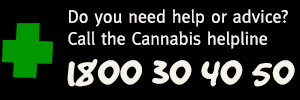Cannabis and prescribed medications
Sometimes people use cannabis (and other drugs) in the belief that it will help them cope better with their problems and feelings. Using cannabis in this way, however, can cause those problems to become more severe and difficult to manage in the long-term.
The effects of cannabis on mental health
Cannabis has a range of mental health effects on people. Some people experience very unpleasant psychological effects when they use cannabis, such as severe anxiety or panic reactions. At high doses users may hear voices or see/taste/smell things that are not really there (hallucinations), or have beliefs that are not true (delusions). These symptoms are more likely to be felt by people who are not used to the effects of cannabis or who have smoked more than they usually do. These experiences do not usually last after the effects of the cannabis wear off, but can be very frightening, and may be enough to put some people off using the drug again.
Some people appear to be more vulnerable to the mental health effects of cannabis than others, particularly younger people and those with a family history of mental health problems. Doctors prescribe medication for depression, psychosis, bipolar affective disorder or schizophrenia to bring relief from the unpleasant symptoms that a patient may be experiencing. If that person continues to use cannabis while taking prescribed medications, unknown reactions can occur, which may make their condition worse. It also makes it very difficult for their doctor to prescribe the correct drug at the appropriate dose to improve their symptoms, as well as increasing the risk of non-compliance with medication regimes. Furthermore, cannabis use can make symptoms of mental health conditions such as schizophrenia worse, if people diagnosed with this condition use the drug.
Mixing cannabis with antidepressant medication
People who have been diagnosed with depression can be prescribed antidepressants. There are four main groups of antidepressants and the commonly used medications are listed with brand examples:
- Tricyclics – nortriptyline (Allegron), clomipramine (Anafranil), amitriptyline (Tryptanol), imipramine (Tofranil), dosulepin (Prothiaden)
- Selective Serotonin Reuptake Inhibitors (SSRIs) – sertraline (Zoloft), paroxetine (Aropax), citalopram (Cipramil), fluoxetine (Prozac), fluvoxamine (Luvox)
- Monoamine Oxidase Inhibitors (MAOIs) – moclobemide (Aurorix) phenelzine (Nardil), tranylcypromine (Parnate)
- Newer antidepressants – mirtazapine (Avanza), venlafaxine (Efexor) and reboxetine (Edronax)
Very little research has been conducted on the effects of using cannabis while taking prescribed antidepressant medication. The side effects of antidepressants can be similar to those produced by cannabis use, and these include the following:
- abnormally fast heartbeat (tachycardia)
- dizziness
- anxiety
- panic
- drowsiness
- nausea
- confusion
Using cannabis while taking prescribed antidepressants can intensify any or all of these side effects and make a person feel worse.
Mixing cannabis with antipsychotic medication
Antipsychotic medication is prescribed for people who have had psychotic episodes and have been diagnosed with schizophrenia. Common antipsychotic medications with examples of brand names used in Australia are:
- Antipsychotic Medications (older medications) – chlorpromazine HCl (Largactil), haloperidol (Serenance, Haldol), trifluoperazine (Stelazine), flupenthixol (Fluanxol), zuclopenthixol (Clopixol)
- Atypical Antipsychotic Medications (newer medications) – olanzapine (Zyprexa), risperidone (Risperdal), clozapine (Clozaril, Clopine), quetiapine (Seroquel), ziprasidone (Geodon, Zeldox), amisulpride (Solian), aripiprazole (Abilify), paliperidone (Invega)
Antipsychotic medications are most effective in treating the hallucinations and delusions associated with schizophrenia and other psychotic disorders, however they may not help with other symptoms such as motivation and emotional responsiveness. Because of this, people with schizophrenia can experience depression, which may also need to be treated. All these symptoms are made worse if cannabis is being used.
Research suggests that counselling can greatly improve the chances of a person giving up or cutting down their cannabis use while taking medication.
While there is very little research on the effects of the combination of cannabis and antipsychotic medications, there is evidence that suggests that those people prescribed clozapine experience less craving for cannabis than those who are prescribed risperidone or quetiapine. Further research into this area is being conducted.
Getting help
If you use cannabis regularly and take prescribed medications, or know someone who does, the following things may help:
- make sure the prescribing doctor is aware of the cannabis use and how much is being used
- see a specialised counsellor – it greatly improves the chances of decreasing or stopping cannabis use while taking medication
- give the medication a chance – it can take up to six weeks for antidepressant and antipsychotic medications to take effect
- be aware that if cannabis is taken with antidepressants, it can produce similar side effects and intensify reactions, such as rapid heartbeat, dizziness, anxiety, nausea and sweating
- do not take cannabis with tricyclic antidepressants because this increases the risk of rapid heartbeat and other side effects such as confusion, restlessness, mood swings and hallucinations
- do not take cannabis with MAOI antidepressants as it is thought to affect the way the medicine works
- do not use cannabis with newer antidepressants as there is very little published research about possible reactions
- there has been limited research on taking cannabis with SSRI antidepressants. However, the limited information available suggests that SSRIs may be a safer choice of antidepressant if you use cannabis. Make sure you speak to your doctor for further information
- avoid using cannabis if you are prescribed antipsychotic medications
- if there are any problems experienced while being on medication and using cannabis see a doctor or other healthcare professional
Remember, the medications prescribed by a doctor are to improve the health and wellbeing of the patient. Using cannabis at the same time, will make the symptoms worse and the medications less effective.
For more information please see the factsheet 'treatment for cannabis use problems'.














